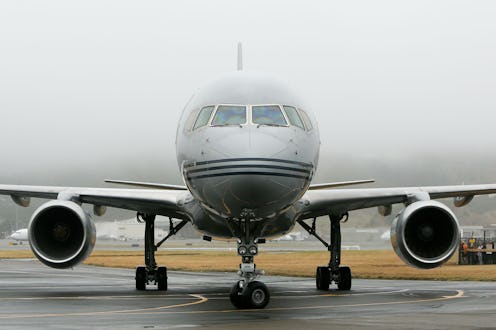
Any kind of travel can be anxiety-inducing, but for people with dealing with flight anxiety, it can be truly scary. The Anxiety and Depression Association of America says flight anxiety usually involves several separate fears — people may afraid of being in an enclosed space or afraid of something bad happening in-air. "This fear can stem from a fear of not feeling in control," psychologist Barbara Cox, Ph.D., tells Bustle. "As with any fear, the symptoms can include physical symptoms as well as psychological systems – anything from tense muscles, chest pains, heart palpitations, stomach pains, dizziness, to impaired judgment, cloudy thinking, and worrisome thoughts about the future."
The recent news about a Southwest Airlines flight making an emergency landing due to an engine failure mid-flight is scary for anyone to read about, but for people with flight anxiety, it can be incredibly triggering. One woman died after a plane window broke, while seven people suffered minor injuries, according to PBS NewsHour. But it's important to note that flight fatalities are exceedingly rare in the U.S. — TIME points out that Tuesday's accident is the first fatal tragedy on a U.S. commercial airline in nine years. "Airplane crashes are much less common than car crashes, so when they do happen, they tend to be reported widely on media outlets, which makes them stand out in our minds," says Dr. Cox.
But of course, our fears aren't always based on rational facts, so it's valid if you're feeling even more anxious about flying following this news. Because flying isn't always avoidable, it's a good idea to have strategies to conquer it, in addition to speaking to a therapist if your flight anxiety is getting in the way of your everyday life. Here are seven things to keep in mind when you're anxious about flying.
1Remind Yourself That Flights Are Safe
I've already mentioned this, but it's worth a refresher: Your chances of being injured or dying on a flight are very, very low. Per the Federal Aviation Administration, more than two million people travel by air daily in the U.S., and we went nine years without any commercial plane crash fatalities. Anxiety doesn't always care about rational facts, but it's something to keep in mind once you start to feel fearful.
2Relax Before A Flight
Try to relax as much as possible in the days leading up to a trip. Whether it's yoga, deep breathing, or meditation, learning how to calm yourself down during anxious, high-stress moments will undoubtedly prove useful. "One of the techniques I teach my clients to clear flight phobia is basic self-hypnosis to relax the body and clear the mind," says Dr. Cox "Anything you can do prior and during the flight to promote relaxation — such as deep breathing, listening to soothing music or listening to a calming self-hypnosis recording — helps." This is especially useful if you get nervous in the days leading up to travel.
3Learn More About What To Expect During A Flight
If your anxiety is caused by fear of the unknown, why not explore how planes work? NASA has an informational page geared toward children that's actually really helpful for people of all ages. As silly as it may seem, knowing more about why planes are usually so safe could help you feel better.
4Learn Your Triggers
Once you know which part of flying makes you anxious, you can anticipate and address triggers. Is it the idea that you can't exit the aircraft once it's in flight? Does regular turbulence freak you out? Identify what specifically triggers your anxiety, and develop specific techniques for them, and you'll be prepared for high-stress situations.
5Avoid The Bar
Getting a drink to calm your nerves before a trip may seem tempting, but it's generally not a good idea if you're afraid of the flight ahead. Alcohol can actually increase your anxiety levels and intensify the unpleasant feelings you're dealing with. Experts also recommend avoiding caffeine — Everyday Health reports that it can make you feel jittery because it's a stimulant and trigger your "fight or flight" response.
6Distract Yourself
If your flight anxiety is severe, a doctor may recommend medication that could help keep you calm. The ADAA says most doctors will recommend anti-anxiety medication for people with serious flight phobias, but they aren't magic fixes. If you're dealing with a moderate level of flight anxiety, bring things that'll keep you distracted in your carry-on bag, like books, crossword puzzles, or calming music. You can also pack a natural sleep aid like melatonin to help you fall asleep for the duration of the flight.
7Pay Attention To Safety Instructions
One of the most effective tools for me when I'm feeling anxious about a situation is asking myself what the most realistic worst-case scenario is and how I'll respond. Paying attention to the safety instructions allows you to soothe your anxiety and create a plan — but remember, you'll statistically never need to put it into action.
As with any kind of anxiety, flight anxiety can be scary, but with these tools at your disposal, it is definitely manageable.